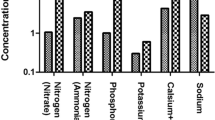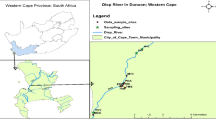Abstract
In 2015, the treated wastewater production was 711 million cubic meters (mm3) per year, in which 511 mm3 was used, while the remaining 200 mm3 was disposed in the sea or wasted in desert areas. By 2030, the projected volume of produced wastewater is about 1400 mm3, each drop of which has to be utilized. This study examined the public attitude toward expansion of treated wastewater reuse in the United Arab Emirates (UAE). A multiple-choice questionnaire which covered demographic information, knowledge related to water resources and attitude was prepared and posted online. The answers of 1304 UAE residents (male = 444 and female = 860) were collected, presented and analyzed with the use of T test, one-way ANOVA and Chi-square. Results show that 30% of respondents are aware of the water shortage problem, while the remaining 70% are unaware (30%) or do not know (40%). However, the majority (80%) are taking measures to conserve water and are willing to pay extra fees for having centralized wastewater treatment systems installed where they live. There is a positive attitude toward the use of treated wastewater for some agricultural and industrial purposes. The respondents support the use of treated wastewater for preserving the environment and easing pressure on expensive desalinated water and depleting groundwater. Results also revealed statistical significance toward wastewater reuse based on gender, age, level of education and income. Respondents ranked incentives for reuse of treated wastewater and critics against reuse.









Similar content being viewed by others
References
Abdel Hamid, J. (1987). Psychological studies of the Arab personality. Cairo: World of Books.
Abdel Rahman, R. A. (2016). Attitude and behavior of Ajman university of science and technology students towards the environment. IAFOR Journal of Education, 4(1), 69–88.
Abdelfattah, M. A., & Dawoud, M. (2009). Impacts of long-term sewage effluent application on heavy metals level in soils of urban parks of Al-Ain, UAE. In: The annual UAE University research conference (Vol. 10, pp. 597–606).
Al Asam, M. S., & Abdul Rahim, A. (1994). The use of sewage treated water in the United Arab Emirates. Green Age, Japan, 3, 2–5.
Al Josamine, A. (1994). Psychology and its social and educational applications (1st ed.). Beirut: Arab Science House.
Al Zubari, W. K. (1997). Towards the establishment of a total water cycle management and re-use program in the GCC countries. In: The Gulf water conference, Muscat (Vol. 3, No. 1, pp. 1–15).
Albarracín, D., Zanna, M. P., Johnson, B. T., & Kumkale, G. T. (2005). Attitudes: Introduction and scope. In D. Albarracín, B. T. Johnson, & M. P. Zanna (Eds.), The handbook of attitudes (pp. 3–19). Mahwah, NJ: Lawrence Erlbaum.
Allport, G. W. (1935). Attitudes. In C. Murchison (Ed.), Handbook of social psychology (pp. 798–844). Worcester, MA: Clark University Press.
Armin, M., Ayoub, A., Sisson, R., & El Khatib, R. (2015). Assessment of water quality of a Manmade Lake in Dubai, UAE. International Journal of Life Sciences Research, 3(2), 88–92.
Atkinson, R. L., Atkinson, R. C., Smith, E. E., Bem, D. J., & Nolen-Hoeksema, S. (1996). Hilgard’s introduction to psychology (13th ed.). Fort Worth, TX: Harcourt Brace College Publication.
Baghapour, M. A., Shooshtarian, W. R., & Djahed, B. (2017). A survey of attitudes and acceptance of wastewater reuse in Iran: shiraz City as a case study. Journal of Water Reuse and Desalination, 7(4), 511–517.
Bruvold, W. H. (1988). Obtaining public support for innovative reuse projects. In: Proceedings of the water reuse symposium, pp. 122–132.
Buyukkamaci, N., & Alkan, H. S. (2013). Public acceptance potential for reuse applications in Turkey. Resources, Conservation and Recycling, 80, 32–35.
Chen, Z., Ngo, H. H., & Guo, W. S. (2012). A critical review on sustainability assessment of recycled water schemes. Science of the Total Environment, 426, 13–31.
Cottrell, S. P. (2003). Influence of sociodemographics and environmental attitudes on general responsible environmental behavior among recreational boaters. Environment and Behavior, 35, 347–375.
Dawoud, M. A., Sallam, O. M., & Abdelfattah, M. A. (2012). Treated wastewater management and reuse in arid regions: Abu Dhabi case study. In: The 10th Gulf water conference, Doha, Qatar, pp. 732–752.
Dolnicar, S., & Hurlimann, A. (2010). Desalinated versus recycled water—What does the public think? In I. C. Escobar & A. Schäfer (Eds.), Sustainable water for the future: Water recycling versus desalination (pp. 375–388). Amsterdam: Elsevier B.V.
Dolnicar, S., Hurlimann, A., & Grun, B. (2011). What affects public acceptance of recycled and desalinated water? Water Research, 45, 933–943.
Dolnicar, S., & Schafer, A. I. (2009). Desalinated versus recycled water: public perceptions and profiles of the accepters. Journal of Environmental Management, 90(2), 888–900.
Domènech, L., & Saurí, D. (2010). Socio-technical transitions in water scarcity contexts: Public acceptance of greywater reuse technologies in the Metropolitan Area of Barcelona. Resources, Conservation and Recycling, 55(1), 53–59.
DuBose, K. (2009). A survey of public opinion for water reuse in Corvallis, Oregon: Attitudes, values and preferences. Corvallis, OR: Oregon State University Master of Public Policy Program.
Dunlap, R. E., & Jones, R. E. (2002). Environmental concern: Conceptual and measurement issues. In R. E. Dunlap & W. Michelson (Eds.), Handbook of environmental sociology (pp. 482–524). Westport, CT: Greenwood Press.
Dunlap, R. E., & Jones, R. E. (2003). Environmental attitudes and values. In R. Fernández-Ballesteros (Ed.), Encyclopedia of psychological assessment (Vol. 1, pp. 364–369). London: Sage.
Eagly, A. H., & Chaiken, S. (1993). The psychology of attitude. Fort Worth, TX: Harcourt Brace Jovanovich.
Fransson, N., & Gärling, T. (1999). Environmental concern: Conceptual definitions, measurement methods, and research findings. Journal of Environmental Psychology, 19, 369–382.
Friedler, E., & Lahav, O. (2006). Centralised urban wastewater reuse: What is the public attitude? Water Science and Technology, 54(6–7), 423–430.
Friedler, E., Lahav, O., Jizhaki, H., & Lahav, T. (2006). Study of urban population attitudes towards various wastewater reuse options: Israel as a case study. Journal of Environmental Management, 81(4), 360–410.
Gallagher, L. A. (Ed.). (2004). Thesaurus of psychological index terms (10th ed.). Washington, DC: American Psychological Association.
Haidt, J., McCauley, C., & Rozin, P. (1994). Individual-differences in sensitivity to disgust e A scale sampling 7 domains of disgust elicitors. Personality and Individual Differences, 16, 701–713.
Hartley, T. W. (2006). Public perception and participation in water reuse. Desalination, 187, 115–126.
Hurlimann, A. (2007). Is recycled water use risky? An urban Australian community’s perspective. The Environmentalist, 27(1), 83–94.
Hurlimann, A., & McKay, J. (2004). Attitudes to reclaimed water for domestic use: Part 2. Trust. Water, Journal of the Australian Water Association, 31(5), 40–45.
Kantanoleon, N., Zampetakis, L., & Manios, T. (2007). Public perspective towards wastewater reuse in a medium size, seaside, Mediterranean city: A pilot survey. Resources, Conservation and Recycling, 50(3), 282–310.
Liu, L. (2006). Public preceptions of water reuse in Santa Clara County, California. In A thesis presented to Faculty of the Department of Environmental Studies. San Joes, CA: San Jose State University, UMI Number 1438577.
Madani, I. M., Al-Shiryan, A., Lori, I., & Al-Khalifa, H. (1992). Public awareness and attitudes toward various uses of renovated water. Environment International, 18, 489–495.
Maraqa, M. A., & Ghoudi, K. (2016). Public perception of water conservation, reclamation and greywater use in the United Arab Emirates. International Proceedings of Chemical, Biological and Environmental Engineering, 91, 24–30.
Menegaki, A., Hanley, N., & Tsagarakis, K. P. (2006). Social acceptability and evaluation of recycled water in Crete: A study of consumers’ and farmers’ attitudes. Ecological Economics, 62, 7–18.
Miller, E., & Buys, L. (2008). Water-recycling in South-East Queensland, Australia: What do men and women think? Rural Sociology Journal, 18(3), 1–14.
MOEW (Ministry of Environment and Water). (2015). State of environment report (p. 36). United Arab Emirates: Ministry of Environment and Water.
Nancarrow, B., Leviston, Z., Po, M., Porter, N., & Tucker, D. (2008). What drives communities’ decisions and behaviours in the reuse of wastewater. Water Science and Technology, 57, 485–491.
Nancarrow, B. E., Leviston, Z., & Tucker, D. I. (2009). Measuring the predictors of communities’ behavioural decisions for potable reuse of wastewater. Water Science and Technology, 60, 3199–3209.
Ormerod, K. J., & Scott, C. A. (2012). Drinking wastewater: Public trust in potable reuse. Science, Technology and Human Values, 38(3), 351–373.
Pham, T. T. N., Ngo, H. H., Guo, W., Dang, H. P. D., Mainali, B., Johnston, A., et al. (2011). Responses of community to the possible use of recycled water for washing machines: A case study in Sydney, Australia. Resources, Conservation and Recycling, 55, 535–540.
Pinto, U., & Maheshwari, B. L. (2010). Reuse of greywater for irrigation around homes in Australia: Understanding community views, issues and practices. Urban Water Journal, 7(2), 141–153.
Po, M., Nancarrow, B. E., Leviston, Z., Porter, N., Syme, G. J., & Kaercher, J. D. (2005). Predicting community behaviour in relation to wastewater reuse: What drives decisions to accept or reject?. Perth: CSIRO.
Robinson, K., Robinson, C., & Hawkins, S. (2005). Assessment of public perception regarding wastewater reuse. Water Science and Technology, 5(1), 59–66.
Rodriguez, C., Van Buynder, P., Lugg, R., Blair, P., Devine, B., Cook, A., et al. (2009). Indirect potable reuse: A sustainable water supply alternative. International Journal of Environmental Research and Public Health, 6(3), 1174–1209.
Salama, A. A. (2015). Environmental psychology (1st ed.). Riyadh: Dar Al Zahraa Publishing.
Schultz, P. W., Gouveia, V. V., Cameron, L. D., Tankha, G., Schmuck, P., & Franek, M. (2005). Values and their relationship to environmental concern and conservation behavior. Journal of Cross-Cultural Psychology, 36, 457–475.
Schultz, P. W., Shriver, C., Tabanico, J. J., & Khazian, A. M. (2004). Implicit connections with nature. Journal of Environmental Psychology, 24, 31–42.
Stern, P. C., & Dietz, T. (1994). The value basis of environmental concern. Journal of Social Issues, 50, 65–84.
Szabo, S. (2011). The water challenge in the UAE (p. 8). Dubai: Dubai School of Government, Policy Brief.
Tybur, J. M., Liebenman, D., & Griskevicius, V. (2009). Microbes, mating, and morality: Individual differences in three functional domains of disgust. Journal of Personality and Social Psychology, 97, 103–122.
Weber, E. U., & Johnson, E. J. (2009). Mindful judgment and decision making. Annual Review of Psychology, 60, 53–85.
Wester, J., Timpano, K. R., Çek, D., Lieberman, D., Fieldstone, S. C., & Broad, K. (2015). Psychological and social factors associated with wastewater reuse emotional discomfort. Journal of Environmental Psychology, 42, 16–23.
Wilson, Z., & Pfaff, B. (2008). Religious, philosophical and environmentalist perspectives on potable wastewater reuse in Durban, South Africa. Desalination, 228, 1–9.
Author information
Authors and Affiliations
Corresponding author
Additional information
Publisher's Note
Springer Nature remains neutral with regard to jurisdictional claims in published maps and institutional affiliations.
Appendix
Appendix


Rights and permissions
About this article
Cite this article
Abdelrahman, R.M., Khamis, S.E. & Rizk, Z.E. Public attitude toward expanding the reuse of treated wastewater in the United Arab Emirates. Environ Dev Sustain 22, 7887–7908 (2020). https://doi.org/10.1007/s10668-019-00551-w
Received:
Accepted:
Published:
Issue Date:
DOI: https://doi.org/10.1007/s10668-019-00551-w




